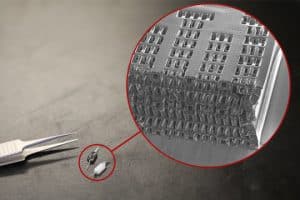Romaco and Ankur target oral film strip market
pharmafile | January 27, 2010 | News story | Manufacturing and Production, Research and Development, Sales and Marketing | Ankur, Romaco, drug delivery, film strips
Packaging and processing technology specialist Romaco has kitted out Indian drugmaker Ankur Drugs and Pharma with a production line for rapidly-dissolving film strips, which can be used to deliver medicines such as painkillers, erectile dysfunction products and hormonal therapies.
The film strips, which are already used in breath freshener products, are roughly the size of postage stamps and dissolve on the tongue in seconds.
“This innovative pharmaceutical dosage form has the potential dramatically to change and expand the landscape of traditional dosage forms,” according to Purnandu Jain, chief executive of Ankur.
The company operates primarily as a contract manufacturer for large Indian drugmakers such as Ranbaxy, Cipla, Wockhardt, Glenmark and Nicholas Piramal.
Its partner Romaco has installed the first ‘StripTabs’ production line at Ankur’s facilities in Baddi, Himachal Pradesh, in what is the culmination of a collaboration going back to 2007, when the Indian firm licensed the technology from German firm Labtec GmbH and Switzerland’s Applied Pharma Research.
Romaco was brought in at the same time to develop the customised production systems for the formulations, including a homogenisers, dryers, heat sealers, cutting machines and primary packaging equipment. The StripTabs are typically presented in soft aluminium foil pouches.
At the time the deal was first signed, Ankur said it was looking at a range of possible APIs to deliver using the technology, including painkiller fentanyl, donepezil for Alzheimer’s disease, erectile dysfunction drug sildenafil citrate, ondansetron for nausea and vomiting and the diabetes treatment glimepiride.
The ondansetron StripTab is expected to reach the market in the second quarter of 2010 and Ankur says it has already entered late-stage negotiations for a licensee.
“Our customers are very interested in taking the user-friendly film tablets,” said Jain.
Ankur’s will be hoping that its investment comes at a time when the film strip market gains a little more momentum after a jerky start in its first few years.
Breath freshener brands such as Listerine PocketPaks and Wrigley’s Eclipse Flash Strips made quick inroads into the marketplace and had more than $300 million in sales in 2003. However, the initial enthusiasm for the products has since dissipated and sales volumes, at least for some products, have declined.
Since 2003, activity shifted to the pharmaceutical market, and particularly the over-the-counter/consumer health sector, but there are still only a handful of products using the delivery technology on the market despite it being compatible with an estimated 600 active pharmaceutical ingredients (APIs).
Use of film strips in pharma kicked off in 2003 when US company Zengen (acquired in 2008 by Migami) launched a strip delivering benzocaine, a local anaesthetic, for the treatment of sore throat.
At the time, the company claimed this was the first time that this type of delivery system had been used for an API. Since then, additional oral strip formulations have been introduced by companies such as Johnson & Johnson (e.g. Benadryl Allergy, Sudafed PE) and Novartis Consumer Health (TheraFlu, Triaminic).
Meanwhile, a few other prescription products are in development, including a film strip formulation of the antiemetic ondansetron being developed by Strativa Pharmaceuticals that has been submitted for approval in the US.
Related Content

DelSiTech announces closing of €10m financing round for silica-based drug delivery platform
DelSiTech has announced the successful completion of a €10m financing round, marking the largest single …

CBD could be used to deliver drugs into the brain, research shows
Cannabidiol (CBD), one of 113 cannabinoids in cannabis plants, could be used to deliver medicines …

Engineers create lab-grown heart and liver tissue for drug testing and discovery
Researchers at University of Toronto have developed “person-on-a-chip” technology which sees the growing of realistic …








